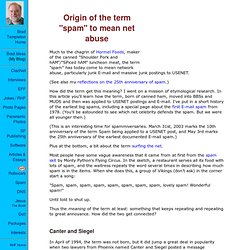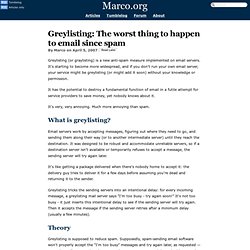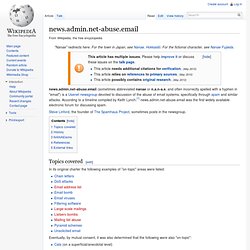

Fight Spam on the Internet! Information about spam. Tips and help for regular users. Spam – Antivirus - Identity Theft - Scams and Fraud: STOP IT. Origin of the term "spam" to mean net abuse. Much to the chagrin of Hormel Foods, maker of the canned "Shoulder Pork and hAM"/"SPiced hAM" luncheon meat, the term "spam" has today come to mean network abuse, particularly junk E-mail and massive junk postings to USENET.

(See also my reflections on the 25th anniversary of spam.) How did the term get this meaning? I went on a mission of etymological research. In this article you'll learn how the term, born of canned ham, moved into BBSs and MUDS and then was applied to USENET postings and E-mail. I've put in a short history of the earliest big spams, including a special page about the first E-mail spam from 1978. (This is an interesting time for spammiversaries. Plus at the bottom, a bit about the term surfing the net. Most people have some vague awareness that it came from at first from the spam skit by Monty Python's Flying Circus.
SPAM REVIEW. Cybertelecom. Scotch Spam: Make the spammers pay! I receive spam emails from my own email address - AOL Help. Fight Spam! Free anti-spam services, tools and software. Greylisting: The worst thing to happen to email since spam. Greylisting (or graylisting) is a new anti-spam measure implemented on email servers.

It's starting to become more widespread, and if you don't run your own email server, your service might be greylisting (or might add it soon) without your knowledge or permission. It has the potential to destroy a fundamental function of email in a futile attempt for service providers to save money, yet nobody knows about it. It's very, very annoying. Much more annoying than spam. What is greylisting? Email servers work by accepting messages, figuring out where they need to go, and sending them along their way (or to another intermediate server) until they reach the destination. It's like getting a package delivered when there's nobody home to accept it: the delivery guy tries to deliver it for a few days before assuming you're dead and returning it to the sender.
Theory. 75 years. Monty Python - Spam. Spam.
German SPAM infos. E-Mail / Webmail. Spam (electronic) An email box folder littered with spam messages Spamming remains economically viable because advertisers have no operating costs beyond the management of their mailing lists, and it is difficult to hold senders accountable for their mass mailings.

Because the barrier to entry is so low, spammers are numerous, and the volume of unsolicited mail has become very high. In the year 2011, the estimated figure for spam messages is around seven trillion. The costs, such as lost productivity and fraud, are borne by the public and by Internet service providers, which have been forced to add extra capacity to cope with the deluge. Spamming has been the subject of legislation in many jurisdictions.[2] A person who creates electronic spam is called a spammer.[3] In different media[edit]
News.admin.net-abuse.email. News.admin.net-abuse.email (sometimes abbreviated nanae or n.a.n-a.e, and often incorrectly spelled with a hyphen in "email") is a Usenet newsgroup devoted to discussion of the abuse of email systems, specifically through spam and similar attacks.

According to a timeline compiled by Keith Lynch,[1] news.admin.net-abuse.email was the first widely available electronic forum for discussing spam. Steve Linford, the founder of The Spamhaus Project, sometimes posts in the newsgroup. Topics covered[edit] In its original charter the following examples of "on-topic" areas were listed: Eventually, by mutual consent, it was also determined that the following were also "on-topic": Cats (on a superficial/anecdotal level) History[edit]
WWW Health.